The gay community faces higher rates of mental health issues due to societal prejudice, discrimination, and social stigma. A gay friendly therapist can help you resolve your mental health problems if you are facing stress, depression, and/or anxiety as a result of your experiences related to your sexuality.
In this article, we’ve reviewed six platforms that provide access to certified gay or LGBT-friendly counselors who can understand mental health problems as they relate to your sexuality, and help you with the psychological issues that you’re facing.
Want to skip right to the suggestions for gay counseling? Here are our 6 recommended therapy solutions:
Gay Counseling Services Near Me/Online
Below, we’ve looked at six platforms that can connect you with an LGBT-affirming counselor who understands and empathizes with the issues you’re going through.
| Provider | Good For | Location | Pricing |
|---|---|---|---|
| BetterHelp | Quick match with the right therapist four you | Online therapy | $65 to $90 per week (billed every 4 weeks) |
| Find-a-therapist.com | Finding and contacting the right therapist for you | Online and in-person therapy | Varies depending on the counselor fee |
| Online-therapy.com | Finding licensed and experienced therapists with a Cognitive Behavioral Therapy (CBT) approach | Online therapy | $40/week to $88/week (including our 20% discount first month) |
| Calmerry | Depression therapy, online grief counseling, anxiety therapy, therapy for OCD, self-esteem therapy, LGBT-friendly therapy | Online therapy | $49.50 to $73.75 per week (billed monthly) |
| TalkSpace | Depression, anxiety, bipolar disorder, OCD, PTSD, psychiatry | Online therapy | Varies according to insurance coverage or self-pay options |
| Inclusive Therapists | Finding and contacting the right inclusive therapist for you | Online and in-person therapy in the U.S., Canada, Hong Kong, Portugal, Taiwan, and Thailand | Varies depending on the counselor fee |
1. BetterHelp
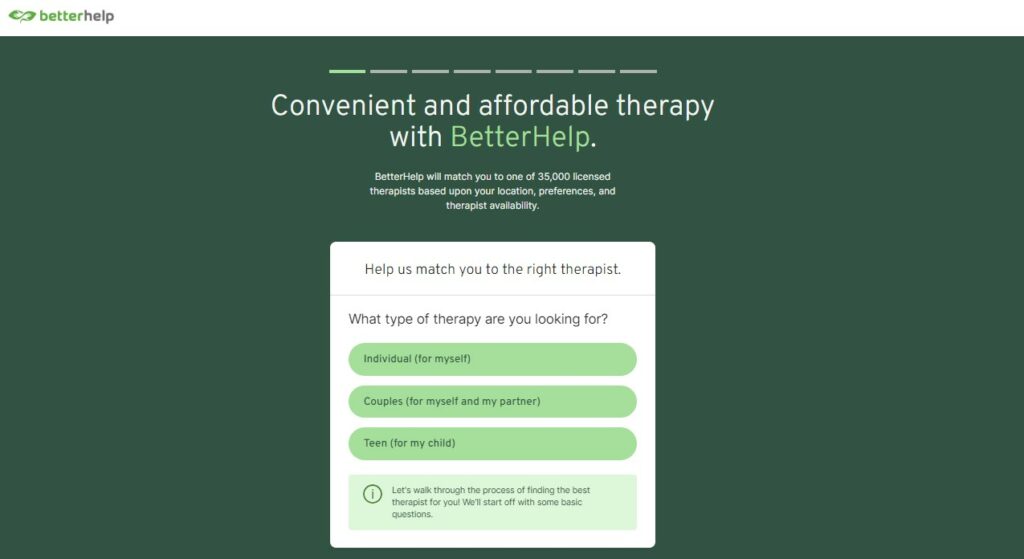
Explore emotional well-being with BetterHelp – your partner in affordable online therapy. With 30,000+ licensed therapists and plans starting from only $65 per week, BetterHelp makes self-care accessible to all. Complete the questionnaire to match with the right therapist.
- Good for: Quick match with the right therapist for you.
- Location: Online therapy.
- Pricing: $65 to $90 per week (billed every 4 weeks).
- Features: iOS and Android app available, message your therapist anytime, live sessions are scheduled weekly and done via live chat, phone, or video call.
BetterHelp is one of the largest and most popular online therapy services where you can find counselors who specialize in providing support for the gay community. You can get matched to a therapist who has opted into receiving LGBTQ clients and specializes in supporting LGBTQ+ communities.
2. Find-a-therapist.com
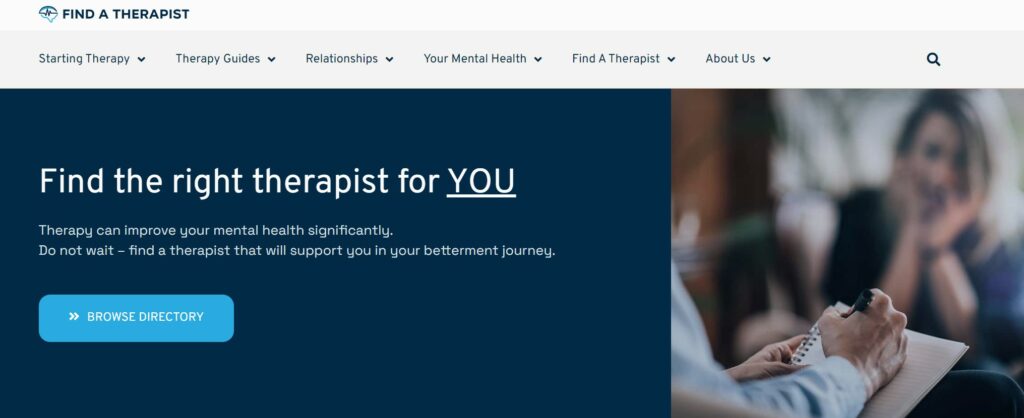
- Good for: Finding and contacting the right therapist for you.
- Location: Online and in-person therapy.
- Pricing: Varies depending on the counselor fee.
- Features: Filter your search, find accessible and effective online and in-person therapy, find guides on different types of therapy.
Find-a-therapist.com offers an online directory where you can filter your search using different categories and keywords according to your preferences. This platform has a range of diverse therapists with experience in gay counseling.
3. Online-therapy.com
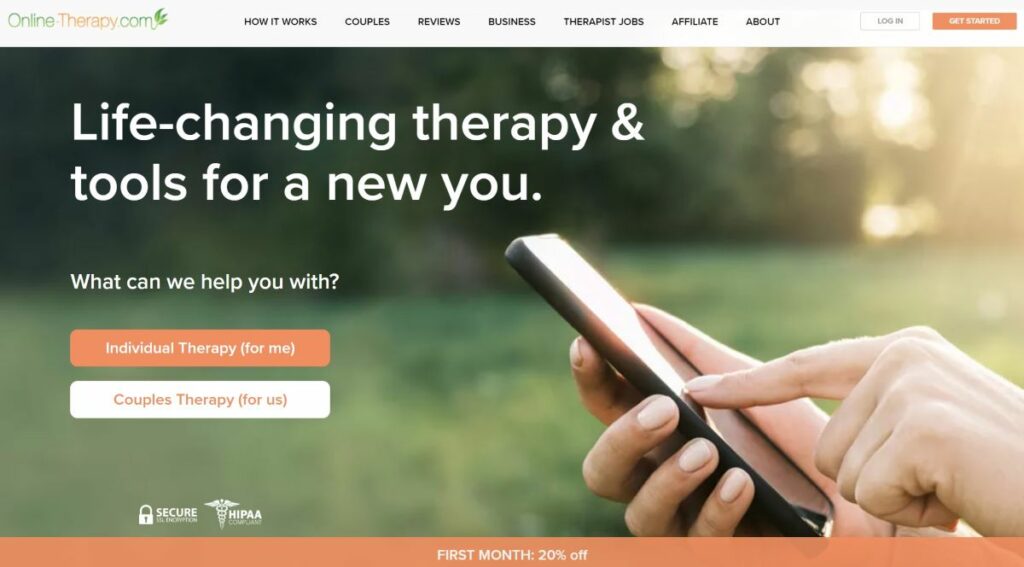
Discover transformative online therapy with Online-therapy.com. Through cognitive behavioral therapy (CBT), Online-therapy.com offers individual and couples support starting at $45/week. Engage in sessions via video, voice, or text for maximum flexibility. Fill out their online questionnaire to get started.
- Good for: Finding licensed and experienced therapists with a Cognitive Behavioral Therapy (CBT) approach.
- Location: Online therapy.
- Pricing: $40/week to $88/week (including our 20% discount first month).
- Features: Unlimited messaging with your therapist, including a daily journal and activity plan, yoga and meditation videos, and tests to see your progress.
Online-therapy.com is an online platform where individuals can connect with therapists specialized in gay counseling. This platform offers two types of therapy according to your needs – individual therapy or couples therapy for relationship issues.
Read our online-therapy.com review here.
4. Calmerry

Embark on a journey of mental wellness with Calmerry. With diverse subscription options, starting at just $50, Calmerry makes prioritizing your mental health simple and accessible. You can message your therapist any day or schedule a live therapy session from the comfort of your home from any device.
- Good for: Depression therapy, online grief counseling, anxiety therapy, therapy for OCD, self-esteem therapy, LGBT-friendly therapy.
- Location: Online therapy.
- Pricing: $49.50 to $73.75 per week (billed monthly).
- Features: Message to your counselor anytime, text therapy and video therapy according to the plan you choose, free counselor switching.
Calmerry offers gay-friendly therapy for different issues. This platform matches you with the right therapist after you answer a short questionnaire where you can express your preferences for gay counseling.
Read our Calmerry review here.
5. TalkSpace
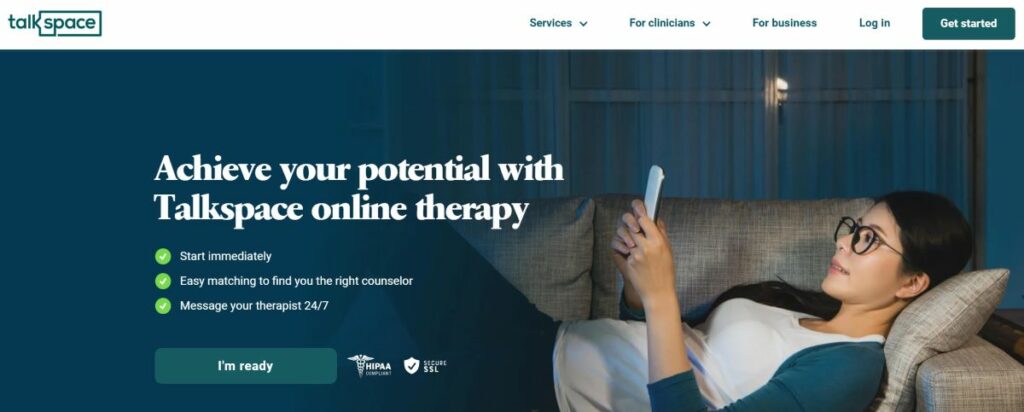
Tailored to individuals, couples, teens, and offering psychiatry services, Talkspace plans kick off at a wallet-friendly $69 per week. What’s more, many health insurances also cover their services, enhancing accessibility and affordability. Complete a questionnaire and get matched with the right therapist for you.
- Good for: Depression, anxiety, bipolar disorder, OCD, PTSD, psychiatry.
- Location: Online therapy.
- Pricing: Varies according to insurance coverage or self-pay options.
- Features: Accepts insurance, live video sessions and unlimited messaging with your therapist, medication management.
TalkSpace is an online platform that offers different mental health services, including gay counseling. Through this platform, individuals can connect with licensed therapists via text, video, or voice messaging, offering flexibility in communication based on their preferences and needs.
Read our TalkSpace review here.
6. Inclusive Therapists

- Good for: Finding and contacting the right inclusive therapist for you.
- Location: Online and in-person therapy in the U.S., Canada, Hong Kong, Portugal, Taiwan, and Thailand.
- Pricing: Varies depending on the counselor fee.
- Features: Online directory, get matched with the right therapist for you, culturally responsive, LGBTQ+ affirming, social justice-oriented therapists.
Inclusive Therapists is a directory that provides the contact information and details of gay affirming counselors located near you. Upon visiting Inclusive Therapists, you can put your ZIP code in the box on the right, click “Search Now”, and the directory will list counselors qualified available near to where you live.
How do Gay Counseling Services Work?

First of all, a counselor may ask you some questions about your symptoms, aggravating factors and triggers, and how these symptoms are affecting your overall wellbeing.
Next, the counselor will analyze your symptoms, observe your verbal and body language, and then devise different therapeutic plans to alleviate your symptoms, treat the root cause(s) of the issue, and improve your mental health. Depending on the severity and complexity of the issues you’re facing, this process could take anywhere from a few weeks to a few months’ worth of therapy sessions.
The benefit of seeing a therapist specializing in gay counseling is that they will have experience in helping people going through similar issues to you. For example, they might be able to provide specific advice about overcoming anxiety if you’re thinking of coming out to your family.
Once a treatment plan has been carried out, and you have some strategies you can use to manage your symptoms on a day-to-day basis, you might like to schedule follow-up sessions with your counselor. During these sessions, a counselor will check in with your progress and provide further guidance to help you maintain your mental health in the long term.
Common Mental Health Issues Faced by the LGBT Community
According to the Trevor Project’s 2020 survey, about 40% of the LGB community reported experiencing serious suicidal thoughts, and almost 68% of the LGBTQ community reported generalized anxiety disorder (GAD) symptoms.
Some of the major mental health issues faced by the gay community include the following:
1. Depression and Stress
There is a higher prevalence of depression and psychological stress in the gay community. Sometimes, this stress may become so severe that it can interfere with your daily living activities, including work and study.
Similarly, LGBT people are at increased risk of developing major depressive disorder or dysthymia.
2. Eating Disorders
Gay people are sometimes affected by eating disorders. Anorexia nervosa is the most common disorder in this community, followed by bulimia nervosa, binge-eating disorders, and others.
Despite experiencing high rates of disordered eating behaviors, gay individuals may be less likely to seek treatment for eating disorders due to factors such as fear of stigma, lack of culturally competent care, and concerns about disclosing their sexual orientation to healthcare providers.
3. Reduced Self-esteem
Due to stigmatization and discrimination, you may feel decreased self-esteem and reduced self-confidence as a member of the gay or lesbian community.
Some LGBT people also lack the confidence to reveal their sexuality or gender identity and feel guilty and/or unloved, especially when family support is lacking. A therapist can help to work through these types of complicated issues and their effects on your mental health.
4. Substance Use Disorders
Identifying as gay or lesbian can be challenging, as you have to confront social stigma, discrimination, and even the threat of verbal or physical abuse, depending on your family and social environment. Due to these environmental factors, some LGBT people gravitate toward substance abuse.
A research study has found that alcohol, amphetamine, marijuana, and opioids (mainly heroin) are the most common substances used by the LGBTQ community.
Causes of Psychological Issues in the Gay and Lesbian Community

Several factors are responsible for making you prone to serious mental health problems as an LGBT person. These causes may include, but are not limited to:
Social Discrimination and Prejudice
Despite homosexuality and gay marriage now being legal in most first-world countries, society still discriminates against the gay community.
Depending on your personal experiences, and the specific type of prejudice you encounter, this can have significant negative effects on your mental health. Social discrimination can lead to serious emotional disturbances and stress disorders.
Fear of Coming Out
Fear of coming out can put you under severe stress. Many members of the gay and lesbian community restrain from revealing their sexual orientation because they don’t want to face negative reactions from the people around them.
While there is nothing wrong with keeping your sexuality a secret if you want to do so, especially if you are not in a supportive environment, the Centre for Disease Control and Prevention (CDC) states that LGBTQ persons who are open about their sexual orientation generally have better mental health than those who hide it due to a fear of coming out.
If you are in two minds about coming out, a counselor can help to provide strategies to manage the stress you are facing, and find the best way forward.
Family Rejection
Gay people sometimes face rejection from their families for being homosexual. These family rejections result in many negative psychosocial outcomes such as reduced self-esteem, failure in relationships, and social isolation.
Moreover, for teens and young adults in particular, your family may even try to control and modify your sexual orientation. Practices such as conversion therapy can be seriously damaging to your long-term mental health.
Different Types of Therapy Used by Gay Friendly Counselors
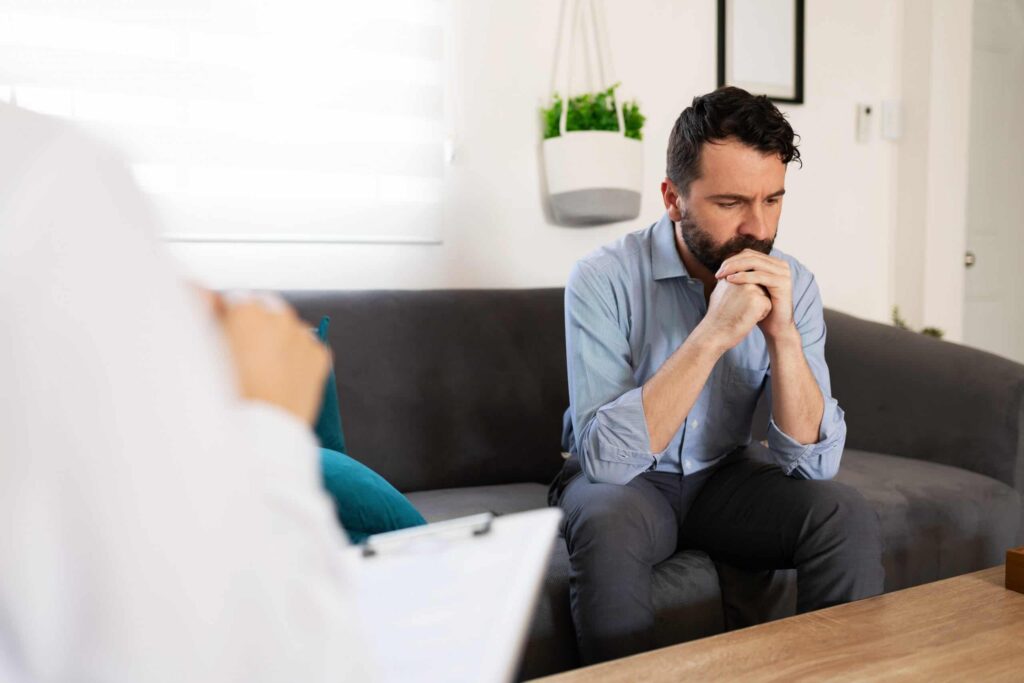
Many different types of therapy are used by counselors specializing in gay counseling to alleviate the symptoms of the mental health issues that you’re facing. Below, we’ve explained some of these psychotherapeutic approaches.
Gay Affirmative Psychotherapy
Affirmative therapy is one of the most common types of treatment used to help LGBT people come to terms with and accept their sexuality.
In affirmative therapy, a counselor encourages you to share your thoughts about your sexual orientation, societal reactions, and any associated negative thoughts in an affirmative environment.
The counselor might provide you with reassurance and support, as well as advice in case you are suffering from discrimination or prejudice from friends or family members. They will help you to be more confident with your sexual identity, especially if you are uncertain at the moment, and allow you to overcome the stress or anxiety you might be facing.
Cognitive-Behavioral Therapy (CBT)
CBT is often used to manage some of the mental health issues that LGBTQ+ people often face. Counselors use this type of talk therapy to treat social phobias often faced by gay or lesbian individuals. Similarly, issues such as eating disorders, anxiety, stress, and depression are also treatable using CBT.
First of all, when beginning Cognitive-Behavioral Therapy, a therapist may help you acknowledge any negative behaviors associated with negative thoughts that you are unable to control, such as low self-esteem, if you have been bullied as a result of your sexuality. Then, the therapist helps you modify these negative thought patterns, and change them into more positive ones.
Trauma-focused CBT

Trauma-focused CBT is a form of CBT focused on treating psychological traumas commonly experienced by gay and lesbian individuals. In trauma-focused CBT, a therapist may guide you to explore previous traumas, and then try to heal these psychological scars.
Although a counselor uses the basic principles of CBT in trauma-focused CBT, this type of therapy is more focused on addressing your previous trauma. The difference is that in trauma-focused CBT, a counselor integrates trauma-sensitive interventions with CBT, using a more focused approach. Instead of following a comprehensive methodology as in CBT, a trauma-focused CBT therapist focuses specifically on helping you learn the skills and behaviors you need to cope with the trauma you have experienced.
Dialectical Behavioral Therapy (DBT)
DBT is a modified form of CBT in which a therapist uses different psychotherapeutic techniques to help you manage stress, regulate emotions, and discover and accept your sexual identity.
The core principles of DBT are mindfulness and interpersonal effectiveness, which can help you tolerate negative emotions and establish healthier relationships with others. A counselor can also help you feel happy in the present without taking on board the stress of what others think, feel, or say about your sexuality.
Group Counseling
Group counseling can help create a source of emotional support for gay individuals who are struggling with their mental health. By sharing your thoughts about your sexual orientation with others, you can overcome the feeling of being estranged and alone.
Moreover, group therapy can also help redeem your self-esteem and self-confidence, as others explain how they have overcome similar issues to what you are dealing with.
Conclusion
Identifying as gay or lesbian may put you at a higher risk of developing mental health issues due to societal discrimination, prejudice, and stigmatization.
Therapists specializing in gay counseling help individuals navigate the complexities of sexual orientation, gender identity, and societal pressures. Their work contributes to the well-being and empowerment of LGBTQ+ individuals, promoting resilience, self-acceptance, and authentic living.
Resources
Bidell, M. P., & Whitman, J. S. (2013). A review of lesbian, gay, and bisexual affirmative counseling assessments. Counseling Outcome Research and Evaluation, 4(2), 112-126. Link.
Lucassen, M. F., Stasiak, K., Samra, R., Frampton, C. M., & Merry, S. N. (2017). Sexual minority youth and depressive symptoms or depressive disorder: A systematic review and meta-analysis of population-based studies. Australian & New Zealand Journal of Psychiatry, 51(8), 774-787. Link.





